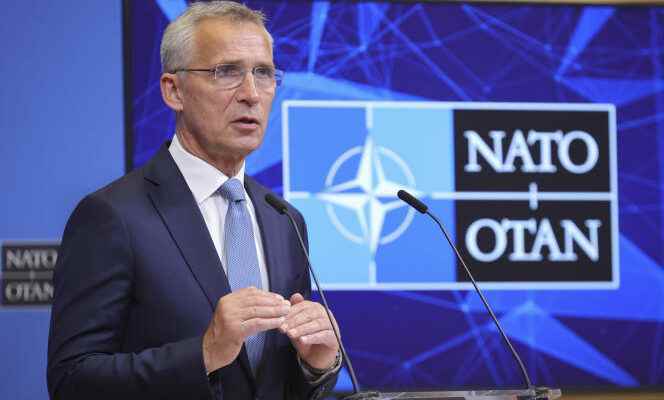Diplomatic tensions between Serbia and Kosovo are not coming down. After the violence that erupted on the border at the end of July, a new attempt at consultation will take place on Thursday in Brussels within the framework of the Belgrade-Pristina dialogue facilitated by the European Union since 2011. Before the meeting, the head of NATO, Jens Stoltenberg, called on the Serbian and Kosovar leaders to “prevent further escalation”.
“I call on all parties to exercise restraint and avoid violence”, Mr. Stoltenberg told the press. He warned that the NATO peacekeeping force in Kosovo (KFOR) was “ready to intervene if stability is threatened”to assure “freedom of movement for all inhabitants” of the former Serbian province.
The Secretary General of the Alliance spoke with the Serbian President, Aleksandar Vucic, then with the Kosovar Prime Minister, Albin Kurti, two weeks before the entry into force of new administrative and border rules imposed by Pristina.
Invoking a principle of “reciprocity”, Kosovo plans to impose temporary residence permits on people entering the country with a Serbian identity card, and to require Serbs in the country to replace Serbian license plates on their vehicles with ones of the Republic of Kosovo. Under American pressure, Kosovo had agreed to postpone the implementation of these measures until 1er september.
These new rules led to a new episode of strong tensions at the end of July in northern Kosovo, where the Serb minority describes them as vexatious.
“Agree on almost no points”
On the eve of the new consultations, Jens Stoltenberg called the two leaders “to be flexible and constructive”. Mr. Vucic, however, told the press to expect “difficult discussions”. “We disagree on almost no points”he warned.
” It does not depend on me (…). There is a new generation of young people [Serbes] in Kosovo who will not tolerate this situation, who will not want to endure terror, who do not see Kosovo as an independent state but as a territory of Serbia, in accordance with international law”he argued.
Belgrade has never recognized the independence proclaimed by Kosovo in 2008, a decade after a bloody war that left 13,000 dead, mostly Albanian Kosovars. Since then, the region has been the scene of episodic frictions. The approximately 120,000 Kosovo Serbs, a third of whom live in the north of the territory, do not recognize the authority of Pristina and remain loyal to Belgrade.
“The Serbian police and army never crossed” the border with Kosovo during the July incidents, assured Aleksandar Vucic, accusing Pristina of“to have lied on this point as on all the rest for one hundred and eighty days, invoking an attack (…) which never has and will never take place”.
Pristina said he was convinced that Serbia would take advantage of the context of the Russian invasion of Ukraine to launch an offensive against Kosovo. Belgrade, which has good relations with Moscow, vehemently denied this, declaring itself “a militarily neutral country, not aligning itself with any bloc”.
“The Kosovars have every reason to be vigilant against the destructive attitude of our neighbour”replied Albin Kurti at a separate press conference. “On one side you have the democratic state of Kosovo, with its professional police. On the other, illegal Serbian structures transformed into criminal gangs, which erect barricades » in the north of the country, denounced the Kosovar Prime Minister.
